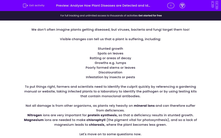We don’t often imagine plants getting diseased, but viruses, bacteria and fungi target them too!
Visible changes can tell us that a plant is suffering, including:
Stunted growth
Spots on leaves
Rotting or areas of decay
Growths e.g. lumps
Poorly formed stems or leaves
Discolouration
Infestation by insects or pests
To put things right, farmers and scientists need to identify the culprit quickly by referencing a gardening manual or website, taking infected plants to a laboratory to identify the pathogen or by using testing kits that contain monoclonal antibodies.
Not all damage is from other organisms, as plants rely heavily on mineral ions and can therefore suffer from deficiences.
Nitrogen ions are very important for protein synthesis, so that a deficiency results in stunted growth.
Magnesium ions are needed to make chlorophyll (the pigment vital for photosynthesis), and so a lack of magnesium leads to chlorosis, where the plant becomes less green.
Let's move on to some questions now.







